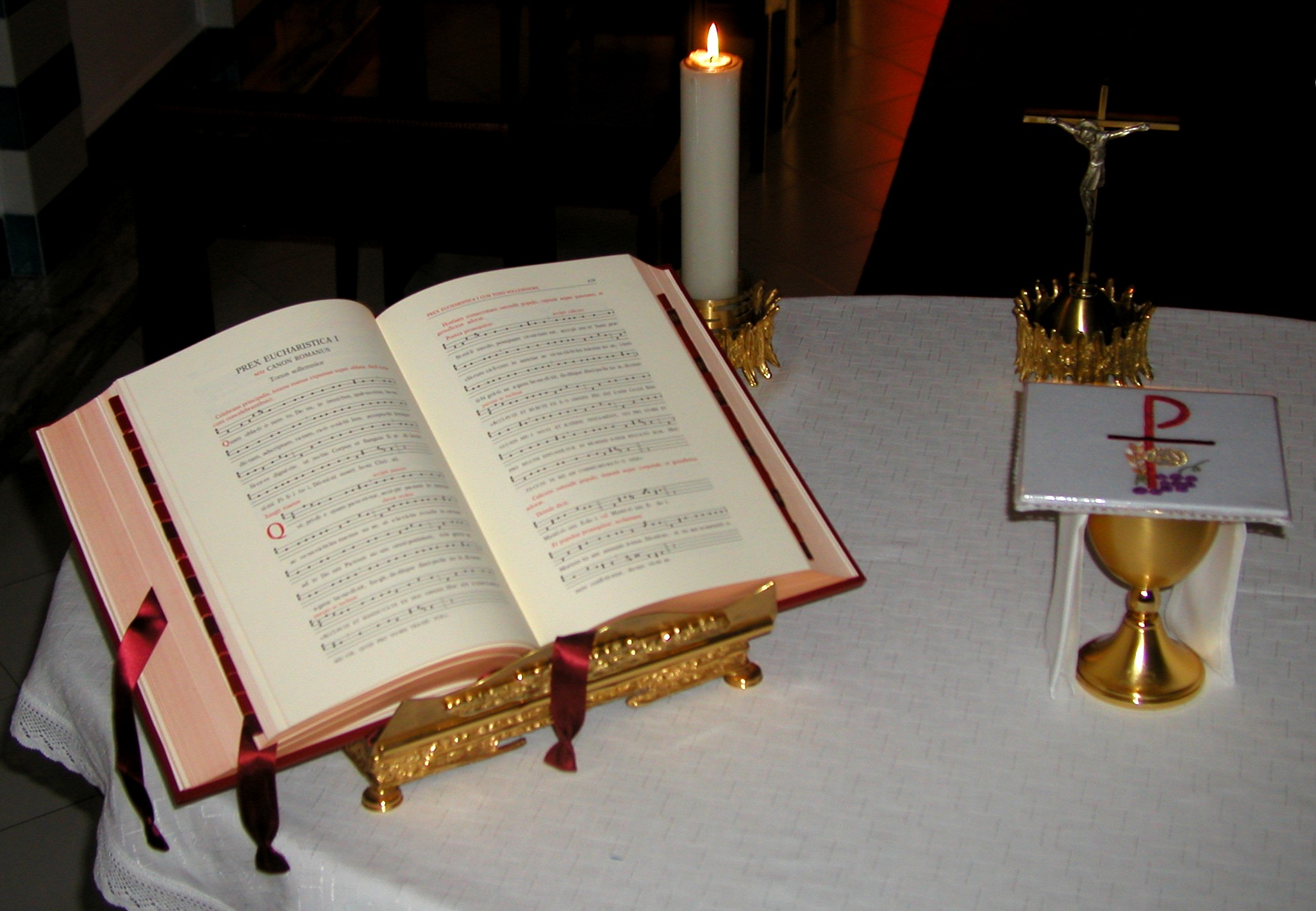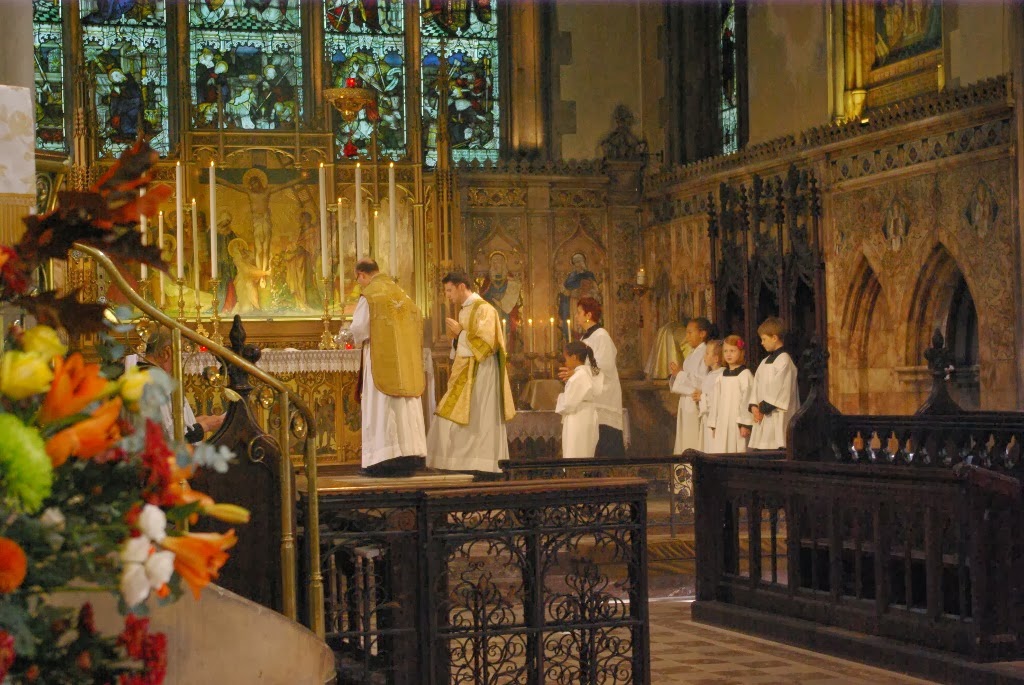|
Collectarium
The ''Collectarium'' (also Collectarius, Collectaneum, Orationale, Capitulare), in the terminology of the Roman Catholic Church, is the book which contains the Collects. History In the ''Proprium de Tempore'' of the Roman Missal the title ''Statio'', with the name of some saint or mystery, is frequently prefixed to the Introit of the Mass. Before going in procession to the statio clergy and people assembled in some nearby church to receive the pontiff, who recited a prayer which was called the Collect. This name was given to the prayer, either because it was recited for the assembled people, or because it contained the sum and substance of all favours asked by the pontiff for himself and the people, or because in an abridged form it represented the spirit and fruit of the feast or mystery. In course of time it was used to signify the prayers, proper, votive, or prescribed by the ecclesiastical superiors (''imperatæ''), recited before the Epistle, as well as the Secrets and t ... [...More Info...] [...Related Items...] OR: [Wikipedia] [Google] [Baidu] |
Roman Catholic Church
The Catholic Church (), also known as the Roman Catholic Church, is the List of Christian denominations by number of members, largest Christian church, with 1.27 to 1.41 billion baptized Catholics Catholic Church by country, worldwide as of 2025. It is among the world's oldest and largest international institutions and has played a prominent role in the history and development of Western civilization.Gerald O'Collins, O'Collins, p. v (preface). The church consists of 24 Catholic particular churches and liturgical rites#Churches, ''sui iuris'' (autonomous) churches, including the Latin Church and 23 Eastern Catholic Churches, which comprise almost 3,500 dioceses and Eparchy, eparchies List of Catholic dioceses (structured view), around the world, each overseen by one or more Bishops in the Catholic Church, bishops. The pope, who is the bishop of Rome, is the Papal supremacy, chief pastor of the church. The core beliefs of Catholicism are found in the Nicene Creed. The ... [...More Info...] [...Related Items...] OR: [Wikipedia] [Google] [Baidu] |
Collects
The collect ( ) is a short general prayer of a particular structure used in Christian liturgy. Collects come up in the liturgies of Catholic, Lutheran, or Anglican churches, among others. Etymology The word is first seen as Latin ''collēcta'', the term used in Rome in the 5th centuryC. Frederick Barbee, Paul F.M. Zahl, ''The Collects of Thomas Cranmer'' (Eerdmans 1999 ), pp. ix-xi and the 10th,Edward McNamara ZENIT liturgy questions, 28 August 2012 although in the Tridentine version of the ... [...More Info...] [...Related Items...] OR: [Wikipedia] [Google] [Baidu] |
Roman Missal
The Roman Missal () is the book which contains the texts and rubrics for the celebration of the Roman Rite, the most common liturgy and Mass of the Catholic Church. There have been several editions. History Before the Council of Trent (1570) Before the high Middle Ages, several books were used at Mass: a Sacramentary with the prayers, one or more books for the Scriptural readings, and one or more books for the antiphons and other chants. Gradually, manuscripts came into being that incorporated parts of more than one of these books, leading finally to versions that were complete in themselves. Such a book was referred to as a ''Missale Plenum'' (). In 1223 Saint Francis of Assisi instructed his friars to adopt the form that was in use at the Papal Court (''Rule'', chapter 3). They adapted this missal further to the needs of their largely itinerant apostolate. Pope Gregory IX considered, but did not put into effect, the idea of extending this missal, as revised by the Francis ... [...More Info...] [...Related Items...] OR: [Wikipedia] [Google] [Baidu] |
Introit
The Introit () is part of the opening of the liturgical celebration of the Eucharist for many Christian denominations. In its most complete version, it consists of an antiphon, psalm verse and '' Gloria Patri'', which are spoken or sung at the beginning of the celebration. It is part of the '' proper'' of the liturgy: that is, the part that changes over the liturgical year. In the Roman Rite of the Catholic Church it is known as the ''antiphona ad introitum'' (Entrance antiphon), as in the text for each day's Mass, or as the ''cantus ad introitum'' (Entrance chant) as in the General Instruction of the Roman Missal, 47 and the First Roman Ordo (sixth to seventh century).Fortescue, A. (1910)"Introit" ''The Catholic Encyclopedia''. Retrieved 2 May 2009 In pre-1970 editions of the Roman Missal, the word ''Introitus'' was used, distinguished from the normal meaning of the word (entrance) by being capitalized. In Ambrosian chant and Beneventan chant, the counterpart of the Introit is ... [...More Info...] [...Related Items...] OR: [Wikipedia] [Google] [Baidu] |
Mass (liturgy)
Mass is the main Eucharistic liturgical service in many forms of Western Christianity. The term ''Mass'' is commonly used in the Catholic Church, Western Rite Orthodoxy, Old Catholicism, and Independent Catholicism. The term is also used in many Lutheran churches, as well as in some Anglican churches, and on rare occasion by other Protestant churches. Other Christian denominations may employ terms such as '' Divine Service'' or '' worship service'' (and often just "service"), rather than the word ''Mass''. For the celebration of the Eucharist in Eastern Christianity, including Eastern Catholic Churches, other terms such as ''Divine Liturgy'', ''Holy Qurbana'', ''Holy Qurobo'' and ''Badarak'' (or ''Patarag'') are typically used instead. Etymology The English noun ''Mass'' is derived from the Middle Latin . The Latin word was adopted in Old English as (via a Vulgar Latin form ), and was sometimes glossed as ''sendnes'' (i.e. 'a sending, dismission'). The Latin term itself w ... [...More Info...] [...Related Items...] OR: [Wikipedia] [Google] [Baidu] |
Francesco Antonio Zaccaria
Francesco Antonio Zaccaria (March 27, 1714 – October 10, 1795) was an Italian theologian, historian, and prolific writer. Biography Francesco Antonio Zaccaria was born in Venice. His father, Tancredi, was a noted jurist. He joined the Austrian province of the Society of Jesus on 18 October 1731. Zaccaria taught grammar, the humanities, and rhetoric in the College of Gorizia, and was ordained priest at Rome in 1740. He spent some time in pastoral work in Ancona, Fermo, and Pistoia, gaining renown as a preacher and controversial lecturer. In 1751 he succeeded Muratori as ducal archivist and librarian of Modena, but was removed in 1768, owing to his ''Antifebronio'', in which he strenuously defended the rights of the Holy See. He was then appointed librarian at the Jesuit professed house in Rome. Clement XIII allowed him an annual pension, continued under Clement XIV, and increased by Pius VI, who appointed him professor of church history at the Sapienza and director of t ... [...More Info...] [...Related Items...] OR: [Wikipedia] [Google] [Baidu] |
Catholic Liturgy
Catholic liturgy means the whole complex of official liturgical worship, including all the rites, ceremonies, prayers, and sacraments of the Church, as opposed to private or collective devotions. In this sense the arrangement of all these services in certain set forms (including the canonical hours, administration of sacraments, etc.) is meant. Liturgy encompasses the entire service: prayer, reading and proclamation, singing, gestures, movement and vestments, liturgical colours, symbols and symbolic actions, the administration of sacraments and sacramentals. Etymology ''Liturgy'' (from ) is a composite word meaning originally a public duty, a service to the state undertaken by a citizen. A ''leitourgos'' was "a man who performs a public duty", "a public servant", ''leitourgeo'' was "to do such a duty", ''leitourgema'' its performance, and ''leitourgia'', the public duty itself. So in the use of liturgy meant the public official service of the Church, that corresponded t ... [...More Info...] [...Related Items...] OR: [Wikipedia] [Google] [Baidu] |



